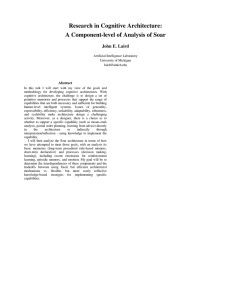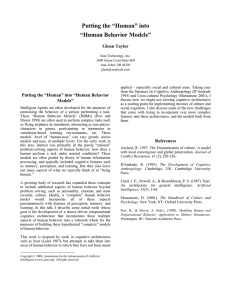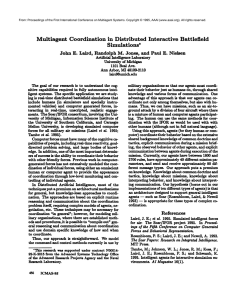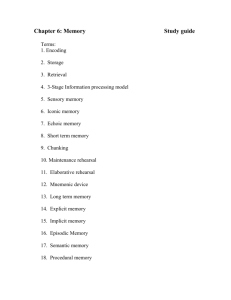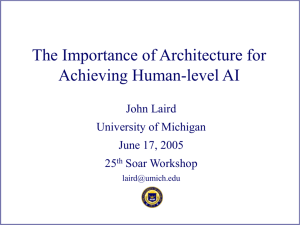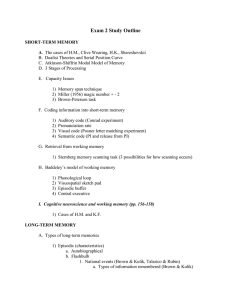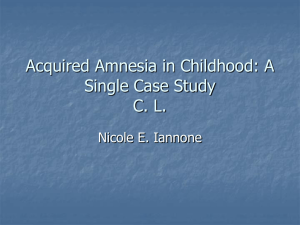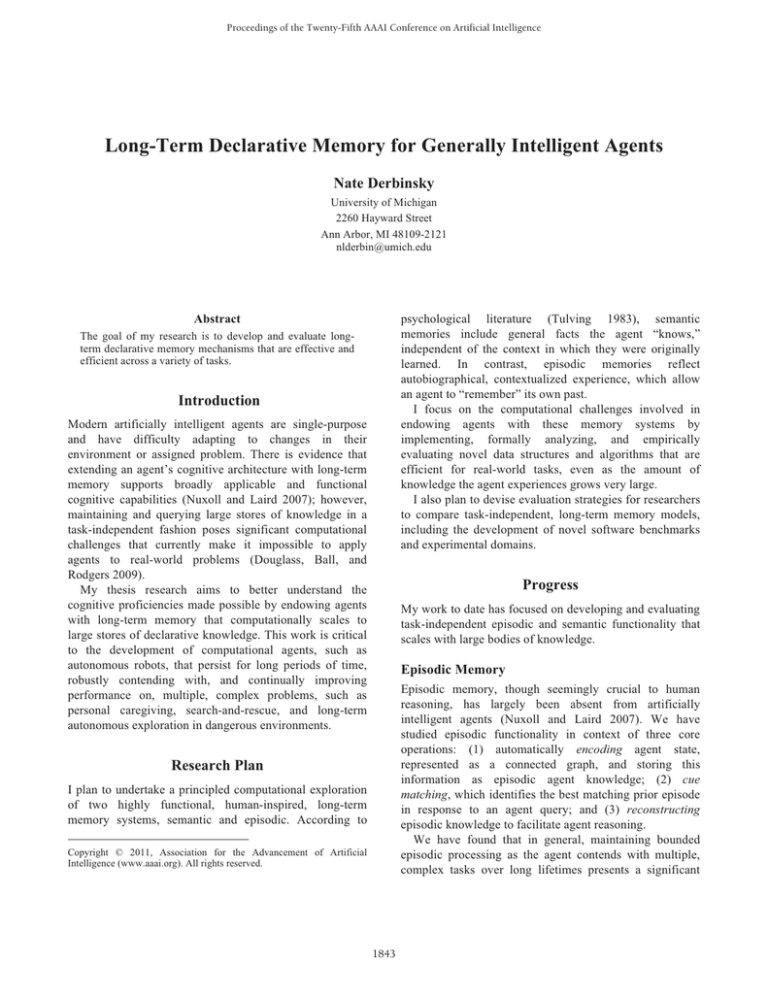
Proceedings of the Twenty-Fifth AAAI Conference on Artificial Intelligence
Long-Term Declarative Memory for Generally Intelligent Agents
Nate Derbinsky
University of Michigan
2260 Hayward Street
Ann Arbor, MI 48109-2121
nlderbin@umich.edu
psychological literature (Tulving 1983), semantic
memories include general facts the agent “knows,”
independent of the context in which they were originally
learned. In contrast, episodic memories reflect
autobiographical, contextualized experience, which allow
an agent to “remember” its own past.
I focus on the computational challenges involved in
endowing agents with these memory systems by
implementing, formally analyzing, and empirically
evaluating novel data structures and algorithms that are
efficient for real-world tasks, even as the amount of
knowledge the agent experiences grows very large.
I also plan to devise evaluation strategies for researchers
to compare task-independent, long-term memory models,
including the development of novel software benchmarks
and experimental domains.
Abstract
The goal of my research is to develop and evaluate longterm declarative memory mechanisms that are effective and
efficient across a variety of tasks.
Introduction
Modern artificially intelligent agents are single-purpose
and have difficulty adapting to changes in their
environment or assigned problem. There is evidence that
extending an agent’s cognitive architecture with long-term
memory supports broadly applicable and functional
cognitive capabilities (Nuxoll and Laird 2007); however,
maintaining and querying large stores of knowledge in a
task-independent fashion poses significant computational
challenges that currently make it impossible to apply
agents to real-world problems (Douglass, Ball, and
Rodgers 2009).
My thesis research aims to better understand the
cognitive proficiencies made possible by endowing agents
with long-term memory that computationally scales to
large stores of declarative knowledge. This work is critical
to the development of computational agents, such as
autonomous robots, that persist for long periods of time,
robustly contending with, and continually improving
performance on, multiple, complex problems, such as
personal caregiving, search-and-rescue, and long-term
autonomous exploration in dangerous environments.
Progress
My work to date has focused on developing and evaluating
task-independent episodic and semantic functionality that
scales with large bodies of knowledge.
Episodic Memory
Episodic memory, though seemingly crucial to human
reasoning, has largely been absent from artificially
intelligent agents (Nuxoll and Laird 2007). We have
studied episodic functionality in context of three core
operations: (1) automatically encoding agent state,
represented as a connected graph, and storing this
information as episodic agent knowledge; (2) cue
matching, which identifies the best matching prior episode
in response to an agent query; and (3) reconstructing
episodic knowledge to facilitate agent reasoning.
We have found that in general, maintaining bounded
episodic processing as the agent contends with multiple,
complex tasks over long lifetimes presents a significant
Research Plan
I plan to undertake a principled computational exploration
of two highly functional, human-inspired, long-term
memory systems, semantic and episodic. According to
Copyright © 2011, Association for the Advancement of Artificial
Intelligence (www.aaai.org). All rights reserved.
1843
computational challenge (Laird and Derbinsky 2009).
However, we have developed system-independent data
structures and algorithms that, in practice, perform fast
enough for real-time task performance, with relatively
moderate storage requirements. We have implemented our
methods within the Soar cognitive architecture (Laird
2008) and evaluated agents on a tile-based competitive
tank game (Derbinsky and Laird, 2009), as well as a highfidelity robotic simulation of building exploration and
clearing operations (Laird, Derbinsky, and Voigt 2011).
Future Work. My work on effective and efficient
semantic memory retrieval heuristics has thus far focused
on a single linguistic task and historical forms of memory
bias. I plan to extend this work to additional domains and
investigate methods for efficiently incorporating present
context as an additional source of retrieval bias.
References
Anderson, J. R., Schooler, L. J. 1991. Reflections of the
Environment in Memory. Psychological Science 2 (6): 396-408.
Derbinsky, N., Laird, J. E. 2009. Efficiently Implementing
Episodic Memory. In Proc. of the Eighth International
Conference on Case-Based Reasoning. Seattle, Wash.
Derbinsky, N., Laird, J. E., Smith, B. 2010. Towards Efficiently
Supporting Large Symbolic Declarative Memories. In Proc. of the
Tenth International Conference on Cognitive Modeling,
Philadelphia, Penn.
Derbinsky, N., Laird, J. E. 2011. A Preliminary Functional
Analysis of Memory in the Word Sense Disambiguation Task. In
Proc. of the Second Symposium on Human Memory for Artificial
Agents, AISB. York, UK.
Douglass, S., Ball, J., Rodgers, S. 2009. Large Declarative
Memories in ACT-R. In Proc. of the Ninth International
Conference on Cognitive Modeling. Manchester, UK.
Laird, J. E. 2008. Extending the Soar Cognitive Architecture. In
Proc. of the First Conference on Artificial General Intelligence.
224-235. Amsterdam, NL.: IOS Press.
Laird, J. E., Derbinsky, N. 2009. A Year of Episodic Memory. In
Proc. of the Workshop on Grand Challenges for Reasoning from
Experiences, 21st IJCAI.
Laird, J. E., Derbinsky, N., Voigt, J. 2011. Performance
Evaluation of Declarative Memory Systems in Soar. In Proc. of
the Twentieth Annual Conference on Behavior Representation in
Modeling Simulation. Sundance, UT.
Langley, P., Laird, J. E., Rogers, S. 2009. Cognitive
Architectures: Research Issues and Challenges. Cognitive Systems
Research 10 (2): 141-160.
Miller, G. A., Leacock, C., Tengi, R., Bunker, R. T. 1993. A
Semantic Concordance. In Proc. of the DARPA Workshop on
Human Language Technology, 303-308.
Miller, G. A. 1995. WordNet: A Lexical Database for English.
Communications of the ACM 38 (11): 39-41.
Navigli, R. 2009. Word Sense Disambiguation. ACM Computing
Surveys 41 (2): 1-69.
Nuxoll, A. M., Laird, J. E. 2007. Extending Cognitive
Architecture with Episodic Memory. In Proc. of the TwentySecond National Conference on Artificial Intelligence, 15601565. Vancouver, Canada.: AAAI Press.
Tulving, E. 1983. Elements of Episodic Memory. Clarendon
Press, Oxford.
Future Work. In my work to date I have assumed that
episodic retrievals are biased only by temporal recency. I
plan to explore additional contextual features, such as
emotional appraisal, that may enhance retrieval quality
across numerous tasks, as well as the feasibility of
computationally scaling these biases to large stores of
episodic agent experience.
Semantic Memory
Unlike episodic memory, semantic memory functionality
has been widely applied in the cognitive architecture and
cognitive modeling communities (Langley, Laird, and
Rogers 2009), though the computational challenges of
efficiently retrieving semantic knowledge from large
declarative stores has gone largely unstudied.
We have formulated and analyzed the computational
challenges involved with supporting efficient access to
large stores of declarative knowledge (Derbinsky, Laird,
and Smith 2010). We detail system-independent data
structures and algorithms, as implemented within Soar, that
support retrievals over very large real and synthetic data
sets, including the entirety of the WordNet lexicon of the
English language (Miller 1995).
We have also begun an exploration into heuristics that
can usefully and efficiently bias semantic retrievals in the
case of ambiguous cues (Derbinsky and Laird 2011). We
are seeking memory biases that are functionally beneficial
across numerous tasks, but have begun our study with the
word sense disambiguation task (Navigli 2009), in which
an agent must identify the most appropriate word meaning
in response to an ambiguous linguistic cue. In this task, we
demonstrated the functional benefit of a set of memory
retrieval heuristics that incorporate the history of memory
access, including base-level activation (Anderson and
Schooler 1991), as applied to SemCor (Miller et al. 1993),
the largest and most used sense-tagged corpus. We have
developed and evaluated system-independent methods to
efficiently integrate these retrieval biases within a taskindependent long-term memory, as demonstrated in Soar.
1844

